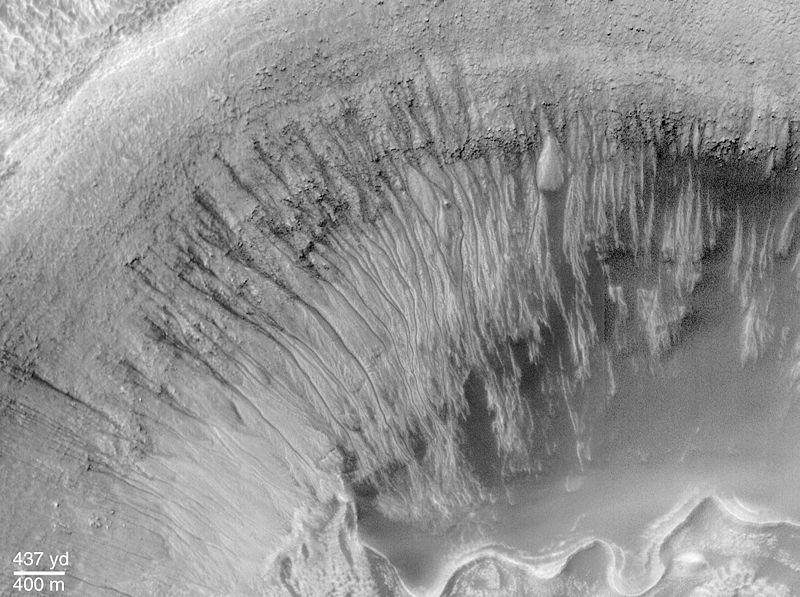Water on Mars raises questions and possibilities
Photo Courtesy of Wikimedia Commons
Dark streaks that line craters are often signs of water
October 4, 2015
On September 28, researchers found evidence to support the long held belief that there is water on Mars. During the summer months liquid water runs down anyons and crater walls. This trail can leave dark stains over land that can reach hundreds of metres in length, after which they dry up in the autumn. Although scientists do not know exactly where the water originates from there are theories. It is speculated that the water condenses out of the atmosphere or that it rises up from underground aquifers. Whatever the origin of the water, the discovery of water on Mars is monumental, but not all that surprising for some.
“If there are ice caps then there must be water. I was not surprised by the discovery,” sophomore Ashmita Gadwalker said.
However, the discovery of water has greater implications, it could mean the possibility of life on Mars, or that it soon may be hospitable. According to researchers though, the likelihood of there being life being life on Mars beyond microbes is slim, and the possibility of humans being able to visit the Red Planet is even slimmer; a sentiments shared by Jefferson students as well.
“I do not think Mars will be habitable soon because the planet has virtually no atmosphere,” sophomore Natasha Narayanan said.
Besides the lack of an atmosphere similar to Earth, visiting Mars also comes with many other issues. Any group that wishes to land a mission on the planet must take extreme precautions to avoid contaminating the planet with microbes from Earth. This would mean that visiting terrain with evidence of water would be the most risky to visit. Not only that, but taking into account the cost of a potential mission, some scientists wonder if the best approach would be to examine Mars from afar.
“I think NASA should put their funds to use elsewhere as Mars isn’t relative to our survival on Earth. Nor does it pose an immediate threat,” Narayanan said.
For now scientists remain focused on deciphering where the water comes from. It is possible that porous rock under the Martian surface contains frozen water that melts with the change of the season. Others believe that saline aquifer are the source of the water, however, this theory cannot explain how the water then seeps down from the top of crater walls. The final possibility is that salts slowly absorb water from the atmosphere. Whatever the reason scientists still have a long ways to go before humans find themselves on Mars, but the possibilities are still endless.
“With the discovery of water, scientists might be able to try out microbial experiments without fear of interruption by any external force,” Gadwalker said. “We might even be able to reach there after tech advancements.”






